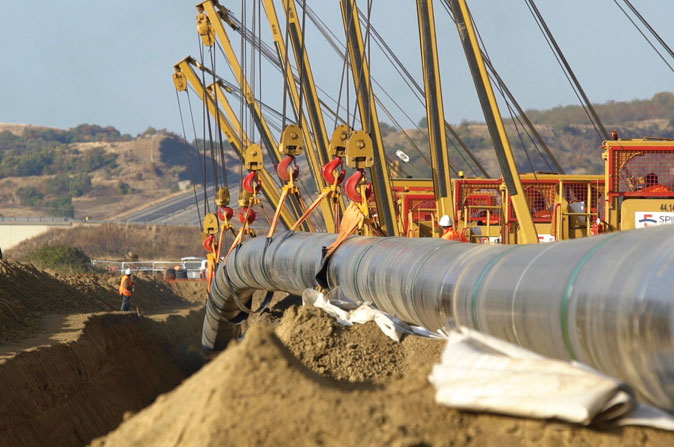Energy / Greece
Gas pipelines turned on full throttle towards Europe
As a de facto transit state in Europe’s gas, Greece aims to make its way in the energy market and act as a regional platform.

Trans-Adriatic gas pipeline crosses northeastern Greece
Greece is at the heart of three vital projects to supply gas to the European Union. And when it comes to Europe’s energy security, the stakes are high. “Greece is gradually becoming an energy platform because of its geographical location. Today, we participate in all energy diversification and security projects in the European Union”, said George Stathakis, Greek Minister for Environment and Energy.
The first of these projects is the southern corridor, also known as the Trans-Adriatic Pipeline, which will bring gas from the Caspian Sea to Europe. The route would allow 10 billion cubic meters of gas per year to circulate from Azerbaijan to southern Italy, via Georgia, Turkey, Greece, Albania, and soon Bulgaria. This 3,500 kilometers long pipeline has been labeled a “project of common interest” by the European Union.
The second project, named EastMed, is a giant submarine gas pipeline planned to link Israel and Italy through Cyprus and Greece. The infrastructure is expected to supply gas to the main European countries from the recently discovered deposits off Cyprus, Israel or from the largest gas deposit ever discovered in the Mediterranean, Zohr, near Egypt.
Finally, Russia is preparing to launch the construction of the immersed section of the “Turkish stream” pipeline, linking Russia to the European part of Turkey and the Greek border through the bottom of the Black Sea. This section of the pipeline will be approximately 910 kilometers long and the cost of the project was initially estimated at 11.4 billion euros.
As a necessary passage for all these rival projects, Greece is courted from all sides and intends to leverage its geographical position to gain geostrategic weight in the sector.
According to Kostas Karayannakos, director general for gas supply and international projects at DEPA, the Greek state-owned gas company: “Greece is already the main entrance of gas from the Caspian Sea through the trans-adriatic pipeline. In fact, for the moment and for the coming years, Greece is the only option for a Europe seeking to reduce its dependence on Russian exports.”
DEPA is part of a consortium named IGI-Poseidon, alongside Edison, a subsidiary of EDF, which is developing these interconnection projects. The project linking Greece to Bulgaria thus creates a south-north connection whereas currently only a north-south link distributing Russian gas exists. A European initiative is also aiming to create a corridor between Greece and Hungary to supply the entire Central European region. Currently, Greece, Hungary, Bulgaria and Romania are participating in the project and other countries like Serbia and the Former Yugoslav Republic of Macedonia are expected to join them.
Russian gas represents one-third of the European demand and remains a price-hiking domination. “I consider that Russia will do everything to defend its market share in Europe. The question here is how can Europe be supplied otherwise than with Russian gas? The Southern Corridor, the East-Med pipeline and LNG reservoirs are the answers to this problem”, explains Kostas Karayannakos. All of these gas pipeline projects should be of interest to foreign investors. “European companies are going to show more and more interest,” Karayannakos says. Especially since DEPA must be privatized, as part of the economic adjustment program signed between Greece and its creditors.
In the field of hydrocarbons, Greece also has other assets. “Greece is not at the center of what is really happening for the exploration and production of hydrocarbons. Yet, it plays a key role for everything regarding the transport and the transfer of the gas”, says Yannis Bassias, CEO of the Hellenic Hydrocarbon Resources Management Agency. He estimates that by the end of 2017, up to 70% of the 2014 tenders will have been awarded to large companies. Mr. Bassias hopes that in the coming months ” big companies will flock to Greece, bringing the economic and technical capacity to conduct thorough research and exploration.” He also underlined that there are already projects in advanced state and others recently concretized with companies like “Total, Repsol, Exxon, or Edison. ”
The whole energy sector is undergoing transition in Greece. “The country is moving towards several privatizations in order to establish a strong regulatory framework for the energy market,” said George Stathakis, Minister of the Environment and Energy. “It’s a turning point that can present opportunities “, he added. At the Thessaloniki International Fair, Chinese investors showed interest in the sector. Indeed, the national electricity company (PPC) signed a principle agreement with the Chinese Development Bank. But this time, the Chinese may face the reluctance of the European Commission that seeks to limit Chinese investments in strategic sectors such as energy. French President Emmanuel Macron, who visited Athens in September, had called on Europeans and especially French entrepreneurs to invest in Greece.
With 87.5% of the domestic electricity market share, PPC is the major player in energy in Greece. Its subsidiary, ADMIE is operating the Greek electricity grid and has already been partially privatized: Chinese state-owned State Grid acquired 24% of its capital last June. “Our current strategy is to diversify and expand to other markets to offset these losses”, said Emmanouil Panagiotakis, CEO of PPC, explaining the real challenge for PPC. Mr. Panagiotakis sees EDF as an ideal development model for the Greek electricity company.
For Mr. Panagiotakis, the future also lies in renewable energies. “PPC was one of the first companies in Europe to focus on renewable energies with a photovoltaic farm installed in Crete and wind turbines on Kythnos island. But we stayed behind, with renewable energies accounting for only 5% of our market share”, says Panagiotakis. The company wants to catch up. “We have sun, wind and geothermal energy, especially in the islands. We think that with these energies we can have green, carbon-free islands, “says Panagiotakis.
